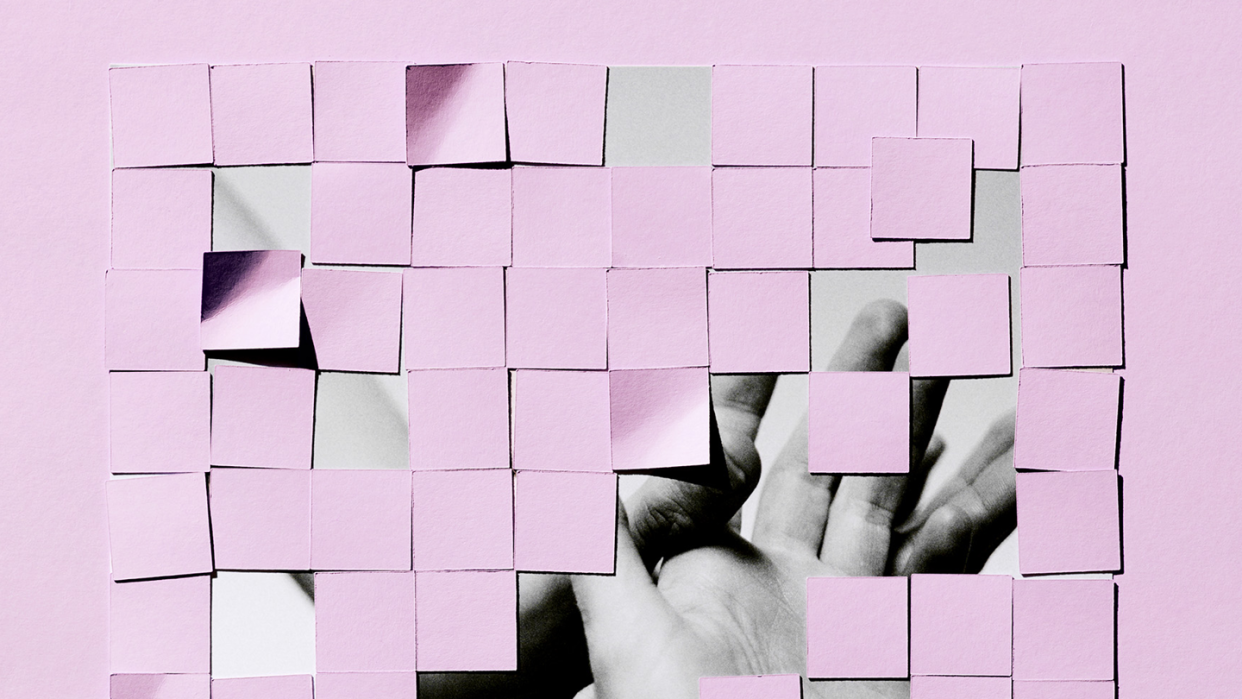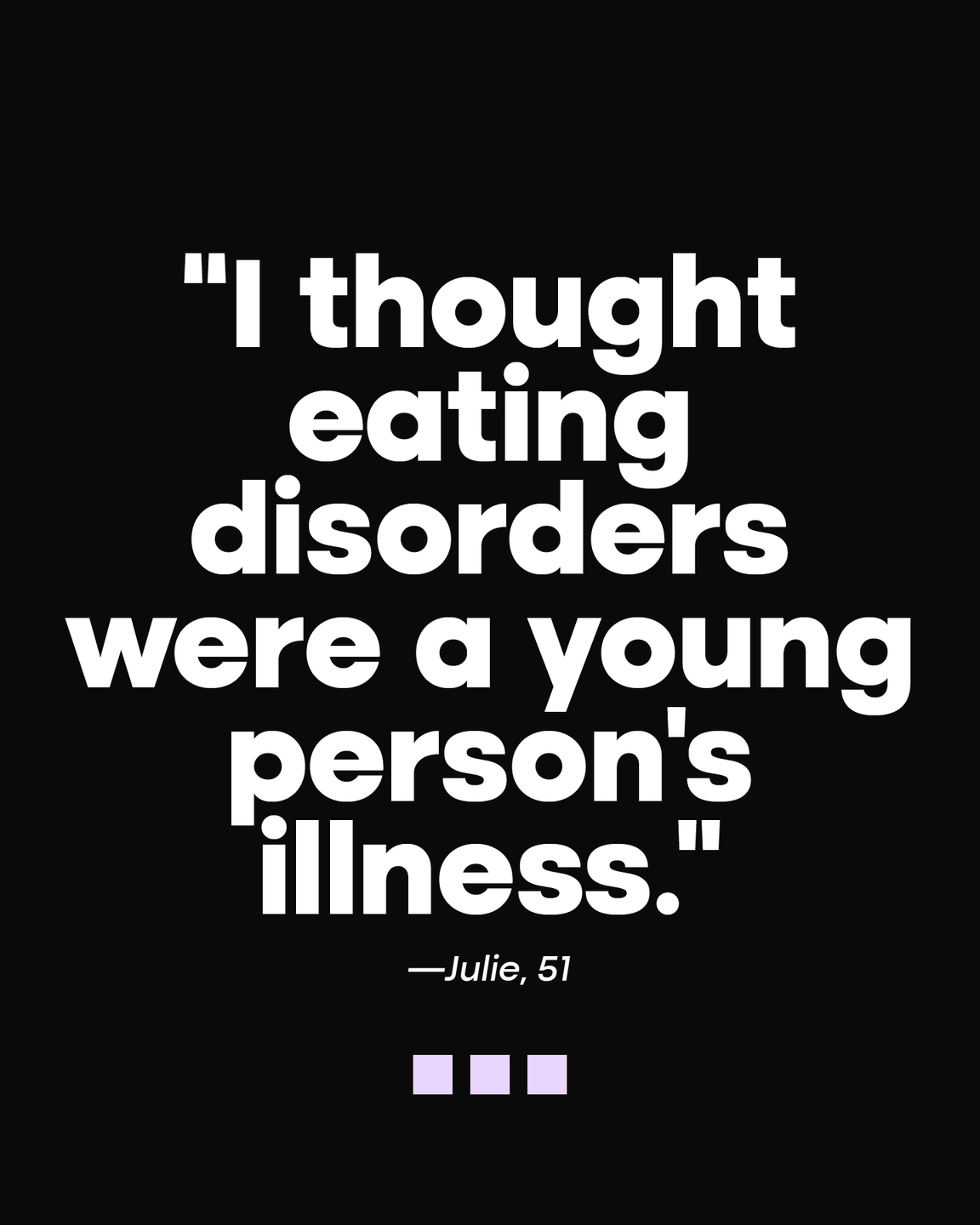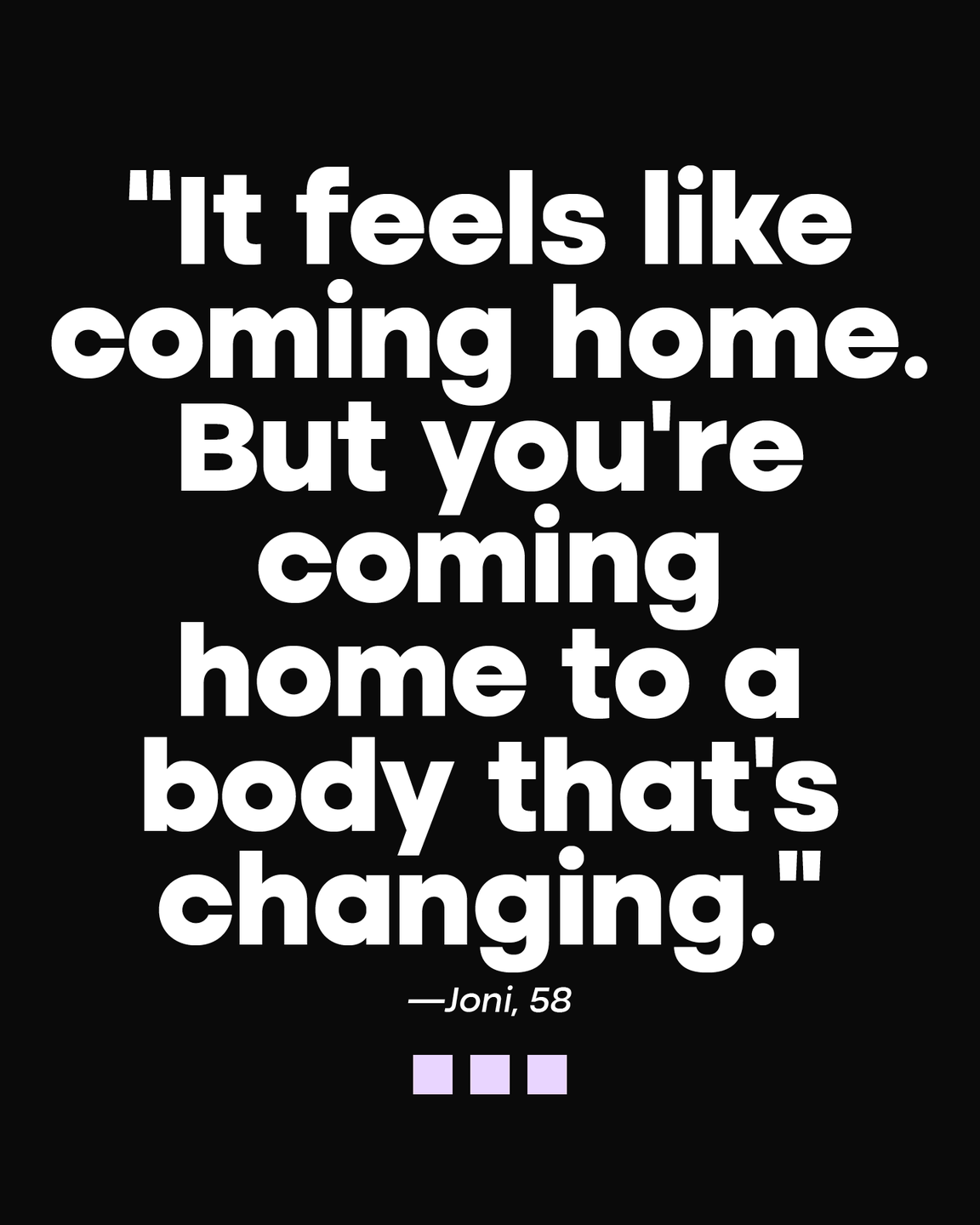This Menopause Side Effect Was Overlooked. Now Doctors Are Raising The Alarm.

"Hearst Magazines and Yahoo may earn commission or revenue on some items through these links."

**TRIGGER WARNING** This story contains sensitive descriptions of eating disorders that may be triggering for certain individuals.
On a crisp April day in 2016, Julie, a 57-year-old social worker, was at a rally in Columbus, Ohio, with a group of colleagues and several busloads of kids. As a loud band played for the crowd, she leaned over to a trusted coworker and admitted two secrets she’d been carrying around with her. “I think I’m relapsing,” she said. “And I think I’m pregnant.”
Julie, a married mom with two daughters, was wrong about the pregnancy. But she was right about the relapse. As a teen, Julie had struggled with an eating disorder before eventually getting it under control as a young adult. Now, at 51, it was back again.
Everything had shifted for Julie four months earlier, in January, when her gynecologist handed her a pamphlet on menopause. After reading through it, she started doing more research on her own. Julie read about hot flashes, night sweats, and brain fog. “But out of all the symptoms listed, the one my brain focused on was weight gain,” says Julie. “I was terrified of weight gain because I didn’t want to get any larger.”
Julie started using an app to count her calories and track exercise—and it worked. “What’s your secret? You look fantastic!” coworkers asked Julie, noting her weight loss. “That just fueled my eating disorder brain,” she says.
By that April rally, four months after entering perimenopause, her calorie counting started to feel out of control. Julie knew she needed help. She couldn’t focus on work. All she could think about was how many calories she was consuming. Every morning she’d strip down and get on the scale to determine which meals she was going to skip, whether or not she might purge or use a laxative, and how many hours she’d spend on her home treadmill. When the treadmill broke, it sent her into a panic.

Yet, even when she admitted this relapse to her friend, she wasn’t entirely sure that it was the same thing she struggled with when she was younger. “I thought eating disorders were a young person’s illness,” says Julie. “I thought, ‘This can’t be happening. I already had that. Why would I have it again?’ ”
Where Puberty Meets Perimenopause
Most people—even those with firsthand experience—associate eating disorders with teens or young adults. They assume that anorexia, bulimia, binge eating disorder, and other specified feeding and eating disorders (OSFED) are relegated to younger women whose bodies are rapidly changing and who are experiencing wild hormone surges, not mature women heading into menopause. And while the vast majority of eating disorders—95 percent—first appear by age 25, they can also appear or reappear later in life.
In fact, you might be twice as likely to have an eating disorder in your 40s (3.6 percent) as to have breast cancer (1.5 percent), according to Val Schonberg, RD, a certified menopause practitioner. What puberty is for eating disorders in adolescence, menopause is for eating disorders in midlife, according to a 2023 review of recent literature on the epidemiology and treatment of eating disorders published in the journal Current Opinion in Psychiatry. Scholars have even coined the term “perimenopausal eating disorders” to explain the phenomenon.
There isn’t a one-size-fits-all explanation as to why some women develop an eating disorder—there’s no single gene or specific environmental or biological trigger that “causes” it to occur. But experts do know that during puberty, perimenopause, and menopause, several similar factors are at play: biological changes (i.e., hormonal fluctuations, altered brain chemistry, and physical changes), psychological shifts (i.e., a changing sense of identity), and external social pressures. While these factors may present differently at different life stages, each one—or all of them together—may increase a woman’s risk of an eating disorder.
“Menopause mirrors what was happening to you at the beginning of your reproductive life,” says Makeba Williams, MD, associate professor and vice chair for professional development and wellness in the department of obstetrics and gynecology at Washington University School of Medicine in St. Louis. Instead of getting their periods, women are getting hot flashes. Sometimes, the transition can make women “feel like their bodies are betraying them,” Dr. Williams adds. And research shows that the more severe a woman’s menopause symptoms are, the worse the eating disorder can be.
Midlife’s frustrating physical shifts can also coincide with psychological and social changes. “It’s a time of upheaval,” says Cynthia M. Bulik, PhD, founding director of the University of North Carolina Center of Excellence for Eating Disorders and codirector of the Center for Psychiatric Genomics. As women begin to hit perimenopause and menopause, some start to question their identity, struggle with big life stressors like caring for aging parents, divorce, age discrimination at work, and the death of loved ones.
Yet, despite all of this, midlife eating disorders are extremely under-researched, and experts are still trying to answer big questions like, Who’s most at risk? What are the triggers? And, What are the best treatments?

A Complex Hormonal Connection
During menopause, your body and brain undergo some radical shifts that can contribute to the development of an eating disorder. New hormone fluctuations not only impact your sleep and mood, but can also affect your appetite. In some people, these changes might even trigger an urge to binge eat, says Bulik. Plus, the decrease in estrogen, increase in body fat, and loss of muscle mass that occur can make it hard to lose excess weight.
“I hear this common refrain from my patients: ‘I’m gaining weight, and there’s nothing I can do about it,’ ” says Dr. Williams, who solely treats middle-aged and menopausal women. “Or, ‘I don’t have the energy to exercise,’ because they’re naturally more fatigued and losing sleep from menopausal symptoms.”
And while these literal hormonal and biological changes are important factors at play, eating disorder risk can also dwell in your DNA (although exactly which genes or genetic codes are involved, science isn't yet certain). “People don’t realize that genes play a huge role in all eating disorders,” says Bulik. “You might be genetically predisposed to developing an eating disorder. But if you never go on your first diet or get teased about your weight, you might never manifest that genetic risk. Genes load the gun and the environment pulls the trigger.”
Nikki, a 37-year-old hospital doctor in Wellington, New Zealand, thinks that a possible genetic predisposition to eating disorders was likely triggered in part by the high-stress environment she experienced as a sporty preteen. Nikki was a gymnast and competitive racer in her youth. “Not everybody who goes into gymnastics or running is going to develop an eating disorder,” says Nikki. “So I obviously have the genetic vulnerability and then experienced the athletic environmental triggers. OCD [an eating disorder comorbidity] also runs in my family.”

Around age 12, Nikki began working out much more and eating much less. Her diet and exercise regimen stopped revolving around the joy of training and started to morph into a form of punishment. But her illness hid in plain sight for years. On the surface, it looked like she was just a very high achieving athlete and perfectionist. Finally, by her late 20s, she sought help and was in recovery. That changed, though, when early perimenopause hit in her 30s. Around that time, Nikki and her husband had been trying, unsuccessfully, to start a family through IVF.
“That hormone change at perimenopause seemed to be another ignition for my body feeling out of control and the reemergence of a lot of eating disorder thoughts and cognition,” says Nikki. “The IVF had a similar effect and I suffered a relapse. It blindsided me.”
Nikki knows that recovering from an eating disorder is not a linear path. And she’s been working on getting to a better place again. “I’ve been in strong recovery at various times, and there have been slips and slides along the way. I have to continue to heal,” she says.

Breaking Through The Noise
Most women going through menopause now grew up in an era when the condition was still considered “rare,” and the signs and symptoms might have been brushed off as simply “cutting weight” or “dieting.” The term anorexia first appeared in the New York Times in 1973, and the Diagnostic and Statistical Manual of Mental Disorders (DSM-III) only added an eating disorder section in 1980. (Case in point: TikTok’s “almond mom” phenomenon where young women showcase their moms’ unhealthy dieting and eating habits.)
“Unbeknownst to me, I lived with an eating disorder for more than 40 years,” says Joni, 58, of Vernon, Connecticut.
For Joni, midlife didn’t trigger a resurgence. It sparked a recognition of what was going on the whole time. As a divorced, single mom who was working multiple jobs to support her family, something shifted when Joni’s three daughters graduated from high school and went off to college. She suddenly had more time to think about herself.
“I never paid any attention to me,” says Joni. “I didn’t realize that I was doing myself harm until there was space for me to think about it in midlife. In that time period of a woman’s life comes that sudden awareness of herself. It feels like coming home. But you’re coming home to a body that’s changing.”

Joni used that new freedom—and the identity change that came along with being an empty nester—to get the support system she needed to put a history of dieting, restricting, and binging (that began at age 10) behind her. She started what she calls her “recovery journey” in her 50s, working with a therapist and a dietitian. Today, she’s a certified intuitive-eating and life coach.
External Pressures Abound
Women with eating disorders aren’t just struggling with internal messages about their bodies, they’re also constantly bombarded by external ones. While everyone worries about teens and social media, women in their 50s can get swept away by the algorithm too.
“My research has found that during midlife, women are negatively impacted by social media’s portrayal of body image,” says Kathleen Bazile PhD, LPC, assistant professor of counseling and director of clinical training at Richmont Graduate University in Atlanta. “Perimenopause and menopause are particularly sensitive times in a woman’s life when they are more vulnerable to the pressures exerted by social media.”
That research finding plays out in real life for many women. “The second you click on something that says ‘This is how you lose weight in midlife,’ your feed gets flooded,” says Margarita, 53, an IT operations manager from Georgia. At 31, she started binge eating at night after the birth of her first daughter. Margarita joined Overeaters Anonymous but struggled to control her binge eating disorder—especially once she hit menopause. “I gained weight even while exercising four times a week, walking my dog, and drinking tons of water,” she says. “I couldn’t do anything about it.”
Margarita is now working with a certified menopause practitioner to repair her relationship with her body and with food. “Meeting with her [the certified menopause practitioner] was the first time someone put a name to my condition,” says Margarita. And now, the practitioner and Margarita’s therapist communicate with each other about how to help her.
As she’s working toward recovery, Margarita is very careful about the body image messages she gets online—even curating her social media accounts to focus on “body positivity, proposals, puppies, and babies.”
“As soon as I see someone on my feed talking about their weight, I unfollow. Or I hide the ad and mark it as ‘offensive’ or ‘irrelevant,’ ” she says.

Finding A Way Forward
While knowledge about disordered eating in puberty is plentiful, medical professionals are only just starting to pay attention to this later pivotal time in a woman’s life. And for those who experience or study midlife eating disorders, the solutions still feel few and far between.
Margo Maine, PhD, wrote her first book about midlife eating disorders in 2005, using statistics mostly from magazine surveys. Twenty years later, she says the available data is basically the same. “We have interest and more awareness now, but there’s nothing really happening,” says Maine, a licensed psychologist and the coauthor of Pursuing Perfection: Eating Disorders, Body Myths, and Women at Midlife and Beyond. “And there’s very little research.”
With better data and insights, experts would be able to create more tailored solutions for midlife eating disorders, because treatment can be more complicated at 50 than at 15. For one, finding the time to leave your life behind and enter inpatient care can be much harder for an adult with a job and financial or family-related responsibilities. Plus, it’s not always easy for women to access critical, competent care from a PCP who understands how perimenopause and menopause affect a woman’s body.
Experts suggest that more outpatient programs for older women could be helpful. Currently, it can be hard (but not impossible) to find people who look like you and who can relate to your life stage in existing treatment programs. A lot of “group programs are full of 18-year-olds—it’s not a good place for an adult woman,” says Maine. (Not all experts agree. Some say the patient age gap can actually help women bond across generations over their shared experiences.)
However, at The Renfrew Center, an eating disorders treatment center with 19 locations across the U.S., there is specific group therapy for older folks (usually in their 30s and beyond) where women can find support talking about what it feels like to not meet the stereotype of an eating disorder patient, says Erin Birely, LCPC, alumni services coordinator at the center.
Health care providers play a role too. When a woman’s doctor lacks education about menopausal changes and their ability to trigger eating disorders, she might slip through the cracks.
“Older women are often met with disbelief,” says Bulik. “You’d be shocked by the number of women who come to me and say, ‘I told my GP I thought I might have binge eating disorder. And he said, ‘You’re too old for that. That’s for younger girls.’ ” Other experts say that weight loss in menopausal women is almost always met with praise rather than pause.
That same awareness is needed at the social level too. Recognizing signs in yourself (and in loved ones of all ages) can help you locate the proper support and begin recovery.
Throughout her recovery, Julie had several friends who stepped up to help her find eating disorder health-care specialists. Her geographic location and her tight budget made it hard to easily find the care she needed, but after listening to podcasts on eating disorders (like The Recovery Warrior Shows) and getting online coaches and therapists from across the globe, she was able to start her recovery journey. “There’s help available and you can be fully recovered,” Julie says. “You just have to ask for help and don’t ever, ever give up.”

How To Help Yourself (And Others)
If you struggled with an eating disorder when you were younger (diagnosed or not), start having conversations with your doctor or therapist before perimenopause or menopause to get ahead of any possible reemergence. “Transitions always put people with eating disorders at risk for an intensification of their symptoms or a relapse. Menopause is especially risky because of the physical and psychosocial changes that can disrupt a woman’s relationship with her body,” says Maine.
Research shows that cognitive-based therapy has been effective in helping patients cope with age-related changes to their appearance, self-worth, and body acceptance.
Sometimes couples therapy can facilitate a family-centric approach, says Schonberg. Partners can learn how to avoid triggering comments and provide support without policing behaviors. It’s important for you to know what help looks like, so you can tell your partner. It could be anything from loving comments to help with meal prep. “If I have a 55-year-old, she has to plan to shop and prepare all of her food plus her family’s—and listen to her family complain about their food likes and dislikes,” says Schonberg. “The pressure on midlife women is high.”
If you’re worrying about a friend or loved one, Birely says you shouldn’t bluntly ask if they might have an eating disorder. Instead, express concern (“I’ve been a little worried about you”) and then add whatever piece of information you have, like noticing they’ve been skipping book club to go to the gym or that they had a hard time sharing dessert with everyone at dinner last night. Don’t mention how their body looks. “You might say, ‘I know there’s a lot going on at our age, and we don’t always have a way to talk about it, but I’d like to be there for you,’ ” says Maine.
“Honor whatever their response is,” says Birely. If they don’t want to open up, she suggests saying, “I’m here if you ever want to talk about anything” and checking in periodically.

Resources
Read, Listen, Reach Out
The Recovery Warriors is an online community that connects people to virtual eating disorder support that leads to progress and results. They produce a podcast called Recovery Warrior Show.
Join, Scroll, Post
Eating Disorders at Midlife and Beyond
A Facebook group for midlife and older women who struggle with binge eating, emotional eating, and other eating disorders. Their goal is to encourage members to support and nurture one another in healthy recovery.
Attend, Talk, Check-In
Their midlife program offers a team of professionals (from psychiatrists to physicians) skilled in helping people over 30 move toward better emotional well-being, health, and recovery. They have inpatient treatment as well as virtual support groups for individuals.
Call, Write, Email
In January, bipartisan congressional representatives introduced the Nutrition Counseling Aiding Recovery for Eating Disorders Act of 2024. The act seeks to offer more comprehensive care (including outpatient medical nutrition therapy) to people on Medicare with eating disorders. Reach out to your representatives and tell them you want it passed.

Getty, Photographed by Joe Lingeman, Prop Styling by Jacqueline Draper
You Might Also Like
